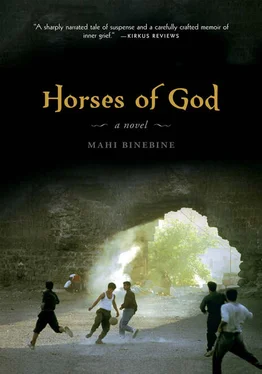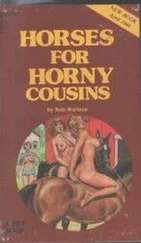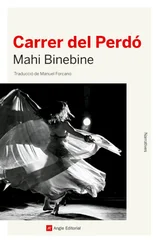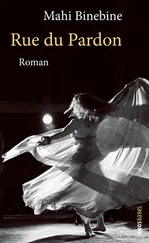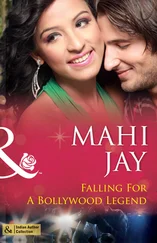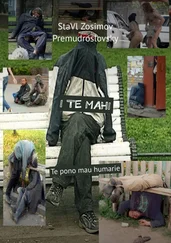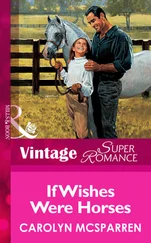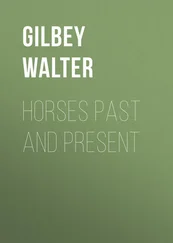The crowd moved from my grave to my brother’s. People formed a circle round my mother, her dead child at her feet. The grave was already filled in, but Yemma moved her hands over the damp soil as if Hamid might still feel her caress. She leaned over to kiss the earth and her face was all streaked with dirt. Said, our eldest brother, took a handkerchief from his pocket, wiped her face, and sat down beside her. As she didn’t object, he edged his arm round her shoulders and pulled her toward him. Little by little she softened. My other brothers joined them. Scenting a tip, the blind beggar followed up with a sura from the Koran that told of the gates to paradise, open wide to the deceased, and the blessings that awaited him there: rivers of milk, wine, and honey; the virgin houris, eternally beautiful young men, and other marvels. He recited with such conviction that he almost made you want to stretch out next to the dead boy. The other beggars upped their game. And Hamid, too, was permitted an almost normal burial.
When Said helped Yemma to her feet and put his arms round her, she let him do it. She seemed so light. He stroked her hair and pressed her to his chest. He whispered something in her ear that spread a shiver of light over her mournful face. It wasn’t, strictly speaking, a smile, but the glow that usually lies behind it. He slid her onto his back and carried her home as if she were a sleeping child.
NO, IT WASN’T all darkness in Sidi Moumen. I had my share of happiness too. My love affair with Ghizlane, Fuad’s younger sister, is proof of that. If there was one thing for which I’d have given up the whole idea of leaving, it was my love for Ghizlane. To think so many lives would have been spared if she’d held me back. Mine for a start, and other people’s — people I didn’t know, whom I carried off in my game bag like a poacher. I know she’d have stopped me going beyond the point of no return if only she’d taken me seriously. One night we met up outside her grandmother’s house. We’d often meet in that blind alley where few people ventured. I tried to talk to her, hinting that it might be the last time we’d see each other. She laughed in my face sarcastically: “Watch you don’t fall in the cesspools, they’re crawling with snakes and scorpions!” I knew every nook and cranny of Sidi Moumen, all the mounds of fresh or recently scavenged rubbish, down to the last square inch of muck; so if I was going to fall in a ditch, it would be because I’d been pushed. It was no good my trying to look stern and serious or explaining it to her, she just kept laughing. Ghizlane was the funniest, liveliest, most radiant girl I ever had the good fortune to meet. The least thing would set her off. She’d slap her knees, and her whole body was so eloquent, you’d never notice how tiny she was. Her presence was so cheering it was as if garlands had been hung all round her, the kind used to decorate the wall on the Feast of the Throne. Her hazel eyes always sparkled, lighting up her face and its oval mouth with an irresistible mixture of charm and innocence. Despite her exuberance, and her slightly affected manner, she was sensitive and deep. When I was alive, I wouldn’t have been able to describe her as I can now. I wasn’t taught the words to convey the beauty of people or things, the sensuality and harmony that make them so glorious. And now, as a lovelorn ghost, I feel the futile need to pour out my feelings and finally tell this story I’ve been turning over and over in my mind since the day of my death.
In the beginning was the dump, teeming with its colony of rascals. The cult of soccer; the incessant fighting; the shoplifting and frantic getaways; the ups and downs of trying to survive; hashish, glue, and the strange places they took you; the black market and the small-time jobs; the repeated beatings; the sudden attempts at escape and their ransoms of rape and abuse. . In the midst of all this chaos a glittering jewel had fallen from paradise: Ghizlane, my sweet and beautiful friend. No one knows how she landed in Sidi Moumen, but she was out of place in our filthy universe, a happy accident. I can still see her in the middle of her carrying hoop, a medium-sized rubber bucket on each side, going back and forth between the street pump and their home. In her long dress with wet patches, she seemed to glide over the loose stones and thistles on the path. The angel of grace had chosen this frail creature to blossom and live among us. If I wasn’t helping Nabil at the dump, I’d offer to lend her a hand. She’d gladly accept and the mere sight of her white teeth made my heart quiver. We chatted as we walked. I’d sometimes do that journey several times in one morning, just as happily each time. I’d put up with my friends ribbing me, calling me a sissy, and with Hamid’s jeers, if he happened to pass by. I loved being with her. Near the pump, we’d play at splashing each other, letting ourselves get soaked to the skin. We’d soon dry off in any case; Yemma would never notice a thing when I got home. Sometimes we’d stop near an isolated hut where, scorning the drought, a vine had clambered through the corrugated roof and reappeared through what must have once been windows. It was a shady place that, miraculously, no one had yet reclaimed. We secretly dreamed of living there one day, but we were too young to contemplate that kind of adventure.
Ghizlane would tell me about the dreadful atmosphere at home since the death of her father, the muezzin, and the marriage of her mother to Uncle Mbark. She didn’t like that man, that hermit crab, who’d taken her father’s place, taken over his job, his bed, his whole life. She didn’t understand how her mother had metamorphosed into a harridan, one of those wicked witches straight out of fairy tales. True, Halima had never been the maternal type, but to neglect her own children to that extent verged on insanity. Now she had eyes only for her new husband, who’d become her lord and master; this man who’d turned her head, for whom she was willing to abandon everything. Was this recent or had it predated her husband’s demise? No one could say. Whatever the truth of it, she’d spend hours making herself beautiful for him. It was as if she’d erased twenty years of her life to become the young, coquettish girl of the past again. Before sunset, she’d settle herself on cushions in the yard and bring out her beauty paraphernalia: a tiny round mirror and a case containing all kinds of powders, creams, and unguents. She attempted to brighten her eyes with a thick line of kohl, dragged almost to the ears, and enhance the coming kisses with lipstick from Fez, then she’d put on a delicately embroidered kaftan and sit herself on a kilim, like a young fiancée awaiting her suitor. When Mbark arrived, absinthe tea and dried fruits were produced, fresh candles were lit, and the transistor radio switched to the national channel, which broadcast popular tunes, patriotic songs to glorify the king, and official news bulletins. She hurried to bring him a basin of warm water with cooking salt for his foot massage. Soon after the radio soap opera, which the lovebirds wouldn’t miss for anything in the world, Ghizlane would serve them supper, which they took à deux in their own room.
This was during the worst of Fuad’s glue addiction, when he almost never came home, or if he did he was in a terrible state, his eyes rolled upward, red as two drops of blood. Ghizlane and I had made it our all but impossible mission to save him; she’d look after him indoors and outside it was up to me. She made him eat, wash, and change his clothes and would physically intervene when her mother, armed with a broad belt, came to give him a thrashing. “You’re no longer part of this family!” Halima would say, summoning their uncle, who’d back her up with a verse from the Koran. Then she began to shriek: “That drug addict is driving me mad! What have I done to the good Lord to deserve such punishment?” Fuad was so far gone, he didn’t even shield his face from the flailing blows. Ghizlane caught a few in the cross fire, but still she put herself between them, defying her mother. Sometimes clumps of her hair were pulled out and she wouldn’t make a sound. She’d get scratched, too, but she stood firm and waited for her mother to calm down before taking care of her brother, who’d be stretched out like a corpse on the palm mat. She took off his plastic sandals, slid a cushion under his head, and covered him with a blanket. She lay down next to him for a little while, to warm him up and comfort him, as her mother would have done had she not lost her mind.
Читать дальше
